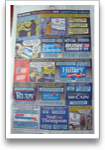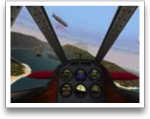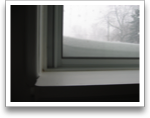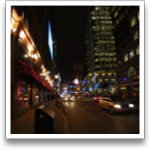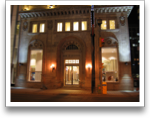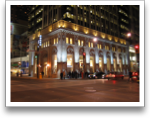Part 33 of elf's Apple PowerBook G4 Journal
#emacs Poetry
Sat Dec 01 21:42:45 2007
i write so bad at line endings,
it doesn't prose no consolers
to define the language you abstract.
yi yi! sing me of poetry:
like that, the desktop is so defiant!
I began with roughly the 3rd word of every line of a part of an
Emacs channel conversation, then chose two or more words and then added
punctuation.

Campaign Logo Analysis
design
Sun Dec 02 14:58:35 2007
A few Sunday's ago, Ward Sutton wrote a thoughtful and comic
critique of the logos of the current U.S. presidential campaign by
using an "Op-Art cartoon" instead of the usual editorial commentary.

Campaign Stops
obama google
Wed Dec 05 21:26:21 2007
Last century, General Motors assembly plants were a regular stop on
the itineraries of presidential candidates. This election cycle,
Google headquarters has become a favorite destination. Hillary Rodham
Clinton, made the pilgrimage in February. Then came John McCain, Bill
Richardson, John Edwards, Ron Paul, Mike Gravel and most recently,
Barak Obama.
...
The proceedings at Google are not unremittingly serious
affairs. Mr. Schimdt asked Senator McCain, "How do you determine
good ways of sorting one million 32-bit integers in two megabytes of
RAM?" Immediately signaling that the question was asked in jest,
Mr. Schimdt moved on. Six months later, Senator Obama faced the same
questionl, but his staff had prepared him. When he replied in fluent
tech-speak ("A bubble sort is the wrong way to go"), the quip brought
down the house.
—Charles Stross, NY Times Sunday Business, Dec. 2, 2007

Pynchon
books pynchon
Fri Dec 07 23:07:24 2007
A screaming comes across the sky.
In the tedium that is December, I have begun reading Thomas
Pynchon's Gravity's Rainbow. I ordered it from Amazon.ca
just before the Christmas rush to qualify for free shipping when I
ordered Stewart Brand's How Buildings Learn which was listed
in Richard Gabriel's bibliography of his 2007 OOPSLA paper Conscientious
Software (which has ideas that are currently only implemented in
hardcore SF that Vinge writes).
I wasn't sure I would enjoy reading Gravity's Rainbow as
so many find Pynchon's writing pretentious and tedious (especially
his latest, Against the Day which, at more than 1000 pages
was, harshly criticized by most literary critics). I can understand
their criticism because as professional reviewers, they work under
publishing deadlines. I, on the other hand, am under no such
obligations; being four five book-reviews behind: The
Elements of Typographic Style, Legacy of Ashes and the comic
book, Watchmen (Update Sat Dec 08 09:49:15 2007: I
forgot Kaufman's Field Guide to Insects of North America).
I am reading Pynchon in morsels— on the train, to and from
Toronto— rather than the marathon sessions one is typically
obliged to undertake during days at the cottage, or whilst lazing
under a beach umbrella and during other so designated periods of
ritualized reading that the publishing industry's marketing division
has invented to sell more books. In the queue for December are
The Princess Bride and Jimmy Corrigan (Update
Sat Dec 08 09:49:15 2007: I forgot Once and Future King).
I should note that the trade paperback 2006 edition of
Gravity's Rainbow cost me CAD$15.30; even though the back
cover lists USD$18 and CAD$23.50. The 1995 edition is cheaper at
CAD$14.50. Ironically, A Gravity's Rainbow Companion costs
more than the book itself.
Update Mon Dec 10 19:55:47 2007: Claire commented saying
that she managed to find A Gravity's Rainbow for USD$7.95
(which was covered over by a $9.95 sticker). She said that her
reading style was similar to mine and that she has read both
Against the Day ("a lot of fun") and Mason &
Dixon ("a lot like Against the Day in some ways, but
is, I think, much sillier. On the other hand, Against the
Day has airships."). She also suggests:
Another frequently-cited-in-the-computing-world architecture
book ... A Pattern Language (by Christopher Alexander
et.al.), which inspired the various computer-programming pattern
languages, and essentially provides sets of nesting and complementary
building and urban-area design components that can be used to
construct buildings that integrate well into their surroundings and
work well within themselves. It's also a beautiful artifact itself,
being a somewhat flexible hardcover designed to sit well in your
hand.
I have added A Pattern Language to my reading list and I
plan on reading Against the Day as I also share a fondness
for airships— the video game, Crimson Skies and
Miyazaki's anime, Laputa: Castle in the Sky, immediately come
to mind.

"My Fair Emacsia"
irony
Sat Dec 08 18:39:54 2007
<cluck> it's all very fine and dandy, but where in hell are we
gonna find a geek that can sing?
<e1f> sachac will do it
I'm thinking of writing a play called "My Fair Emacsia" about a
vintage editor found wandering the streets of London around Covent
Gardens. Essentially, the plot involves a wager between a professor
of Lisp and a professional soldier, who fought in Java, to transform
and modernize the ancient editor.
The heroine of our story is Emacsia Doeslisp (M-x eliza, for
short). There is a song-and-dance number called, "Wouldn't it be
Loverly", about the editor's current defects— "All I want is
multi-threads/Just so the editor doesn't hang". The professor also
does a song, which covering the antiquated terminology used by the
editor, titled, "Why can't a Window be more like a Frame?"
There is another song-and-dance as the first milestone of the
project is reached—"The text in a Region falls mainly between
the Mark and Point" and a song and dance number by Emacsia's father
called, "With a little bit of bloomin' Lisp".
The project is still in its preliminary stages and I want to thank
<offby1>, <bpalmer> and <entropie> for their
initial ideas and help with the songs.

Wii + MacBook Pro + Dome
hardware 3d
Sun Dec 09 17:08:09 2007
Some research
by Paul Bourke on 3D immersive visualization using a Wii remote for
navigation, a MBP for rendering and a dome screen for display. The
conclusions are interesting— the Wii accelerometer alone does
not provide enough data to acuurately determine position; the IR
sensors are an important part of the design.

Ultra-portable Mac Rumours
hardware
Mon Dec 10 14:51:12 2007
I try to avoid posting about rumoured hardware unless the reliable
Wall Street Journal mentions it, however, the ultra-slim,
ultra-portable has been "confirmed" by both Apple Insider and CNBC
(hopefully their sources are independant) for a release at Macworld
2008. Macrumours
has a summary of all the available information.

The Garden Path
philosophy search www
Thu Dec 13 11:51:54 2007
Every path to a new understanding begins in
confusion.
—Mason Cooley
Last month, we were testing a piece of lab equipment to see
whether it would work within our lab environment— Fedora on x86
with VMWare for any Windows-only applications. This piece of
equipment was USB based and since it only had drivers for Windows, it
had to run under VMWare.
As soon as the software attempted to communicate with the
hardware, there was a BSOD and VMWare re-started; the hardware worked
perfectly on a native Windows install. We concluded that the problem
was with this piece of hardware interacting with VMWare and our
Google searches for solutions were tainted with keywords that drew us
away from the real problem.
After a long day of fighting with this problem, in what is one of
the quirks of the human brain— as I washed my hands in the
washroom— it occured to me that the problem might not be
specifically with this piece of hardware but a more general problem
with VMWare and USB. I returned to my office and I removed the
keywords specific to the hardware and searched again. I hit upon the solution in an instant
(result No. 3, Google took 0.15 s). Testing the hypothesis took a few
minutes and I was correct— unloading the USB2.0 kernel modules
and defaulting to the USB1.1 modules was the answer to our
problem.
Basking in the glow of victory (my boss had been working on this
problem intermittently for a few months— were initially given a
defective piece of hardware) I thought about what would have happened
if we didn't have Google's vast storehouse of information at our
disposal. I remembered that I had recently read a blog titled, My Life
Without Google.
So I performed a small test— I searched Yahoo! using exactly the
same keywords, to see if I would have found the answer. Surprisingly
(I had not expected to be successful), I found (in a mere 0.03 s) an
entirely different document (result No. 5) that had a similar answer.
Pretty good, but it could be a lot better.
Rather than searching for problems via conceptual inquiries, we
are still using keywords to search for answers. Sadly, my search
results are only as good as the keywords I use, based on my
intuition. The state of today's serch engines can be summarized
as— if you don't know what you're searching for, don't even
bother looking.

DMCA.ca
drm copyright
Sun Dec 16 09:04:29 2007
The Globe and Mail has a great article describing the events that
led up to the postponement of an "anti-piracy" bill that was to be
tabled by Jim Prentice, the Industry Minister of Canada.
Because of the organizational efforts of Michael Geist, law professor at
the University of Ottawa, 300 questions were submitted online to a
CBC show called Search Engine where the minister was
supposed to appear; the minister cancelled his appearance. Undaunted,
people appeared at the minister's open-house in Calgary and posed the
questions in person. The videos are available on the Facebook group,
which has 25,000 people registered.

Let it Snow
photo
Sun Dec 16 13:08:03 2007
Oh the weather outside is frightful
That was the view outside a corner of my window this morning (note
that it's not a black and white photo). Temperatures hovering around
-20° with the windchill. Since the storm came from the south, it
travelled over the Great Lakes picking up moisture which was then
converted into snow— which is always preferable to rain.
Looking at the weather radar maps last night, Oakville, Hamilton,
Kitchener, St. Catharines and Rochester, NY were buried in
snow. There was actually a thunderstorm in the middle of the morning;
I didn't know what the rumbling sound was until I refreshed the
forecast webpage. This morning's email-bulletin from GO Transit
reported delays of 75 minutes across the system. Surprisingly,
today's NY Times was delivered.

Chipmunk BASIC
software basic
Mon Dec 17 03:26:49 2007
10 PRINT "HELLO WORLD"
20 GOTO 10
The Chipmunk BASIC interpreter for OS X supports AppleScript, graphics,
sprites, sound, speech and OOP. So what if it doesn't have closures,
it's still great for writing kids games.

Yonge and Queen
photo
Mon Dec 17 20:36:42 2007
The photo on the left is a two-image panorama, taken last
Wednesday, of the Christmas decorations on Yonge Street, looking
north from Richmond Street. On the left, is The Hudson's Bay
department store with the awnings decorated with red lights. The next
intersection up the street is Queen Street; the tall building in the
middle-center is the Maritime Life Insurance building built "on top"
of the original Bank of Montreal building, whose facade and interior
has been preserved as a heritage structure.
I have provided two additional pictures, taken in 2005, giving a
better view of the Romanesque architecture of the Bank of Montreal
building at Yonge and Queen. The second photo is of the main doors on
Yonge street (note the slope of the street rising from right to
left— south to north) to the Sen5es restaurant). The third photo
faces north-east and shows the length of the building along Queen
street and the Maritime Life building rising above it. (The lobby of
the Maritime Life building has an interesting sculpture with a
nautical theme.) The last photo (taken from Toronto
Before) shows the building in 1913.
This entry which originally started as a simple post, titled
'Tis the Season, with a Christmasy picture I took last week,
grew into this historical look back at the intersection, for no
apparent reason.

Ludwig von Brahms
music
Tue Dec 18 11:31:18 2007
This morning I remembered that, "Brahms' first symphony (which took
15 years to write) is considered to be Beethoven's tenth symphony". I
don't remember whether I dreamt it or whether I read it
somewhere.
When I Googled for it, I found that it was indeed
true. Which meant that I couldn't have dreamt it because Google
is not yet that powerful. Unfortunately, I don't know where I read it
because I haven't been reading articles on classical music (I
recently read a book review of Steve Martin's autobiography and
started the review of Laurence Bergreen's Marco Polo).
The Wikipedia article does link to a cache of
classical music performed by the Columbia University Orchestra.

Google Grand Prix
iphone google
Tue Dec 18 17:37:41 2007
Earlier this month, Google released new cellphone software with the
codename Grad Prix. A project that took just six weeks to complete,
Grand Prix allows for fast and easy access to Google services like
search, Gmail and calendars through a stripped-down mobile phone
browser. (For now, it is tailored for iPhone browsers, but the plan
is to make it work on other mobile browsers as well.)
It bothers me when I read about something technological in the
newspaper before I've read about it on the net. The article, a
profile of Eric Schimdt, in the New York Times' Sunday
Business section, included a detailed play-by-play of the program's
genesis by an un-named Google engineer from the moment he demo'd it
to his boss to the time Sergey Brin saw it and blessed the project
(total elapsed time: 1 hour).
A Google search for more information results in two hits which
just summarize the article (and you have to add "iphone" to the
keywords "google grand prix").

"The Other Side"
book
Wed Dec 19 22:00:54 2007
“The Other Side”, by Istvan Banyai is the most
surreal children's book I have ever had the pleasure to read.
Lookybook is a new website that lets you browse children's books
using a Flash interface.

That Settles It
secrets
Thu Dec 20 01:45:04 2007
Apple, Think Secret settle lawsuit
December 20, 2007 - PRESS RELEASE: Apple and Think Secret have
settled their lawsuit, reaching an agreement that results in a
positive solution for both sides. As part of the confidential
settlement, no sources were revealed and Think Secret will no longer
be published. Nick Ciarelli, Think Secret's publisher, said "I'm
pleased to have reached this amicable settlement, and will now be
able to move forward with my college studies and broader journalistic pursuits."
Wow.

XKCD At Google
xkcd
Thu Dec 20 16:38:27 2007
Every generation, an artist comes along that
redefines the way we look at art.
—Peter Norvig introducing Randall Munroe
The author of XKCD, Randall Munroe, visited the Google campus to
give a
lecture. Peter Norvig introduces him with a presentation running
on Firefox on his Mac. Knuth also makes an appearance to ask a
question in reference to the recent four-part cartoon strip.
Update Thu Dec 20 21:31:43 2007: I noticed that we share a love
for the Japanese made Pigma Micron markers. In Toronto our university
bookstore used to carry them, but now only art-supply stores (like
Currys) carry them. I have never seen them in office-supply
stores.
Update Mon Dec 31 17:10:14 2007: Beyond Satire is the blogger
who organized Randall's visit to Google.

Saving Graces
emacs
Fri Dec 21 19:00:15 2007
Whereof what’s past is prologue.
—The Tempest, II.i
This is a response to Bryan Murdoch's recent post, My c-x c-s Muscles Are Getting Tired.
I believe that certain Emacs philosophies should be re-considered
in light of advancements in technology. One of those
philosophies is the concept of the state of a file. Currently, a file
being edited in Emacs can exist in one of three states: the version
being edited in the buffer, the last version saved on disk and
previous versions (saved at particular points in time) named with
~s.
But imagine if you could view the file at any point in
time over it's entire lifetime (the smallest time-slice being a
single character change)— from the moment it was created ex
nihilo, to its current state.
Currently, this is idea is only partially possible within the
constraints of a buffer's undo history. But imagine if, 1) the entire
undo history was preserved to disk, 2) there was a mechanism (let's
call it: M-x timemachine) that allowed you to browse
through the undo history and allowed you to replay the entire history
of the file, with the ability to choose which edits from the past you
wanted restored into the current file.
This would require a fundamental change to an Emacs user's
behaviour— it would mean that you no longer had to save a file
because all the edits would be automatially preserved as journalled
transactions, which could be recalled at any moment in its lifetime
to restore the precise contents of the file at that particular
moment.
Notes: I proposed this idea to rms, a few years ago; I don't know
what he thought of it. Now, I think it's time to consider it
again. Also, iPhoto 5 doesn't have a "Save" button/menu-item,
everything is saved automatically; but if iPhoto crashes
unexpectedly, you lose any slide-shows or albums created since it was
started.
Update Sun Dec 23 16:43:50 2007: See the post M-x RememberAll for screenshots
of a prototype interface.

"Twilight of the Books"
books literacy amazon
Sun Dec 23 09:58:09 2007
The New Yorker has a great article
by Caleb Crain, on the decline of readers around the world, who have
substituted television and other electronic entertainment for books.

In a study published this year, experimenters varied the way that
people took in a PowerPoint presentation about the country of
Mali. Those who were allowed to read silently were more likely to
agree with the statement “The presentation was interesting,” and
those who read along with an audiovisual commentary were more likely
to agree with the statement “I did not learn anything from this
presentation.” The silent readers remembered more, too, a finding in
line with a series of British studies in which people who read
transcripts of television newscasts, political programs,
advertisements, and science shows recalled more information than
those who had watched the shows themselves.
...
The Internet, happily, does not so far seem to be antagonistic to
literacy. Researchers recently gave Michigan children and teen-agers
home computers in exchange for permission to monitor their Internet
use. The study found that grades and reading scores rose with the
amount of time spent online. Even visits to pornography Web sites
improved academic performance.
No wonder Amazon.com sells more than just books; I don't think it
would be able to stay in business selling just books in light of a
declining readership. If readership is declining, is the Kindle ebook
reader an attempt to re-kindle the love of electronic entertainment?
In Canada, Amazon.ca is limited to books, CDs, DVDs and video
games. Is Amazon.ca profitable in Canada because there are
proportionally more readers than in the U.S?
M-x RememberAll
emacs interface
Sun Dec 23 16:19:12 2007
On #emacs <offby1> asked how M-x timemachine would work
(perhaps the mode should be called RememberAll since
"TimeMachine" is used by Leopard.). Here are some screenshots that
show a possible interface. The scenario shows Thomas Jefferson
working on the Declaration of Independence:
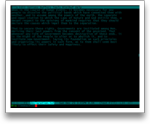
The first screen shows the
current state of the Declaration (declaration.txt) just before
Jefferson invokes Timemachine.
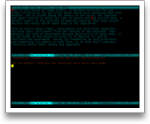
After Timemachine is
invoked, the original window splits and the bottom window displays a
summary of the edits (the number of places the file was revised) and
shows the locations where edits have been made, by fontifying the
first character; the first spot is at the word, "When" and the second
spot is at the first word, "God". If the document is already
fontified, an image glyph may be used to indicate edits.
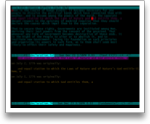
When Jefferson cursors over to the "G", the Timemachine window
displays a history of edits at that spot; the phrase was changed
twice at that spot.
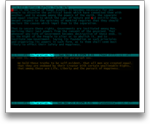
When Jefferson cursors over to the "W", the edit at that location is
displayed.
Setting the variable
rememberall to nil should disable the saving of
history for that buffer. Note that the back-end that RememberAll uses
to handle the transactions is completely irrelevant to the
user— it could be diff run periodically, or vc checkpoints or
saving undo-history to disk. The user shouldn't have to care.

OLPC Journal Feed
olpc
Mon Dec 24 19:53:08 2007
For anyone that's interested, I now have an RSS feed for my
OLPC Journal. The latest news is that deliveries of all 4000+
Canadian orders have been postponed to Jan/Feb. 2008 due to problems
with Customs.

The GPL
Mon Dec 25 00:00:25 2007

And there were in the same channel, nerds idling on irc
watching their screens by night. When suddenly, a gnu appeared and
their buffers were brightly fontified: and they were sore
afraid. Fear not, the gnu said for I bring you glad tidings of great
joy, which shall be to all people. For unto you is given this day in
the city of Cambridge, a license which is the General Public
License. And this shall be the sign: "The GNU General Public License
is a free, copyleft license for software and other kinds of works."
Ye shall find it in every file, wrapped in a comment lying at the
very top. And suddenly there was with the gnu a host of nerds
praising the license.
Another Mac at Sun
hardware sun macbook
Wed Dec 26 08:13:20 2007
Jim Grisanzio joins many other bloggers at Sun who bought a Mac
to replace their notebook computer. He lives in Japan so his Macbook
has a Japanese keyboard (which is not a problem as he knows
Japanese). He was quite impressed with the graphics and the ease with
which the Mac could be made to switch localizations from Japanese to
Latin-1.

Simon Tatham's Portable Puzzle Collection
puzzles
Thu Dec 27 11:34:20 2007
Simon
Tatham's Portable Puzzle Collection has 26 puzzles which can take
anywhere from a minute (Untangle, Guess— a Mastermind clone)
to an entire lifetime, to solve. Binaries are available for Linux
(GTK), Windows, OS X and PalmOS. I hope that when the iPhone SDK is
released, they are ported to the iPhone and iPod Touch.
On the OS X version, the instructions and the manual for each
puzzle is available via the Help menu and the puzzles themselves are
found in File >New Window >"puzzle name"

186 Days
mathilde
Sat Dec 29 22:38:56 2007
I had to reboot mathilde today after 186 days (a record)
of uptime. The problem started when I ran Quinn
(Tetris clone) and it wouldn't start— all I got was a dialog
box with something about "Error (-600)". I then ran top to
verify that there was a Quinn process running; there was. I tried a
Force Quit via the Dock icon, to no avail. I proceeded to manually
kill it via the Terminal; but the Dock thought the application was
still running. Hmmm... Since I had to leave for mass, I closed the
lid and left it at that.
When I returned, I noticed no "white blinking eye" (the LED
indicating peaceful slumber) and the laptop was rather warm— I
encountered this strange phenomenon only once
before. I tried "sudo killall -HUP WindowServer" but
all I got was a black spinner. I gave up after about a minute and I
powered the laptop down and powered it back up.
After it rebooted, I took the opportunity to install
SecUpdate2007-008. mathilde is back up and running now.

Old Cash Cows are Dead
technology future
Mon Dec 31 20:36:29 2007
Music CDs are sort of silly now and the new
technology doesn't leave a lot of room for a new business model.
A great post
by Paul Tyma about the present (fighting to keep the status quo) and
the future (inventing completely different ways of doing things).
I would have to agree with him on nearly all the cash cows (CDs,
music bands, desktop computers), especially about photography—
in the first year I started taking pictures with a digital camera,
out of about 3000 photos, I tooks about 30 good ones (good enough for
public exhibition) and about 3 excellent ones (definite sellers). I
have improved a bit since then— I have to take about 300
pictures to get 30 good ones and 3 excellent ones. Digital cameras
(and Photoshop) have allowed me to experiment with and improve my
photography very inexpensively. I had a film camera and I only took
pictures at family gatherings or outings.
The only point I find myself in disagreement with, is his belief
in the the death of libraries (I think he means that paper books will
disappear). Paper books will disappear when there is reliable
technology that is as durable as paper— there is no electronic
data archival and retrieval method today matches or bests paper
(c. 100 years).


